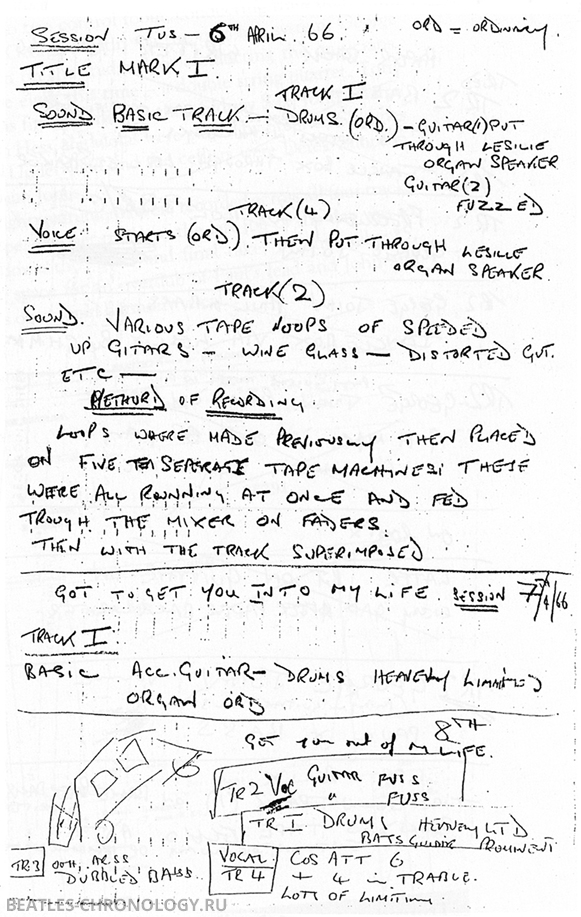Friday, April 8, 1966
Recording "Got To Get You Into My Life"
For The Beatles
Last updated on October 22, 2023
Friday, April 8, 1966
For The Beatles
Last updated on October 22, 2023
April 6 - June 22, 1966 • Songs recorded during this session appear on Revolver (UK Mono)
Recording studio: EMI Studios, Studio Two, Abbey Road
Session April 6 - June 22, 1966 • Recording "Revolver"
Session Apr 07, 1966 • Recording "Tomorrow Never Knows", "Got To Get You Into My Life"
Session Apr 08, 1966 • Recording "Got To Get You Into My Life"
Session Apr 11, 1966 • Recording "Got To Get You Into My Life", "Love You To"
Session Apr 13, 1966 • Recording "Love You To", "Paperback Writer"
Some of the songs worked on during this session were first released on the "Revolver (UK Mono)" LP.
This was the third day of recording the “Revolver” album, continuing the work done on Paul McCartney’s “Got To Get You Into My Life“ the previous day.
Five takes had been recorded so far, in an acoustic vein. On this day, from 2:30 pm to 9 pm, The Beatles started from scratch, recording three takes (numbered takes 6 to 8), with Paul McCartney on bass, John Lennon on organ, George Harrison on electric guitar, and Ringo Starr on drums.
Recorded with frequency control (varispeed) at a slower than normal tape speed, the backing track played back a semitone higher in pitch as well as faster than the original performance.
From The Beatles Recording Reference Manual – Volume 2 – Help! through Revolver (1965-1966) by Jerry Hammack, 2021
Take 8 was now deemed the best and would become the basis of the final released version. Work on “Got To Get You Into My Life” would continue on April 11, 1966.

Recording • Take 6
Recording • Take 7
Recording • Take 8
AlbumOfficially released on Revolver (Super Deluxe - 2022)
The Complete Beatles Recording Sessions • Mark Lewisohn
The definitive guide for every Beatles recording sessions from 1962 to 1970.
We owe a lot to Mark Lewisohn for the creation of those session pages, but you really have to buy this book to get all the details - the number of takes for each song, who contributed what, a description of the context and how each session went, various photographies... And an introductory interview with Paul McCartney!
The Beatles Recording Reference Manual - Volume 2 - Help! through Revolver (1965-1966)
The second book of the Association for Recorded Sound Collections (ARSC)-nominated series, "The Beatles Recording Reference Manual: Volume 2: Help! through Revolver (1965-1966)" follows the evolution of the band from the end of Beatlemania with "Help!" through the introspection of "Rubber Soul" up to the sonic revolution of "Revolver". From the first take to the final remix, discover the making of the greatest recordings of all time.
Through extensive, fully-documented research, these books fill an important gap left by all other Beatles books published to date and provide a unique view into the recordings of the world's most successful pop music act.
If we modestly consider the Paul McCartney Project to be the premier online resource for all things Paul McCartney, it is undeniable that The Beatles Bible stands as the definitive online site dedicated to the Beatles. While there is some overlap in content between the two sites, they differ significantly in their approach.

Notice any inaccuracies on this page? Have additional insights or ideas for new content? Or just want to share your thoughts? We value your feedback! Please use the form below to get in touch with us.